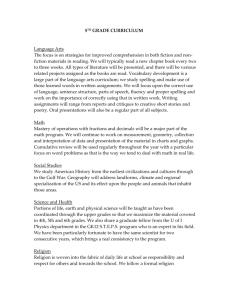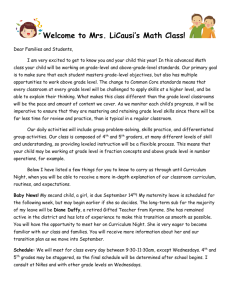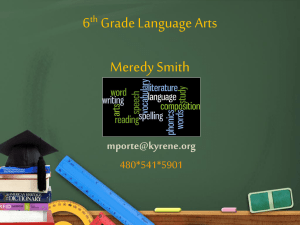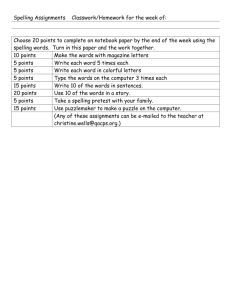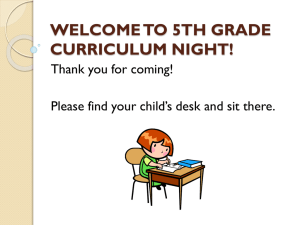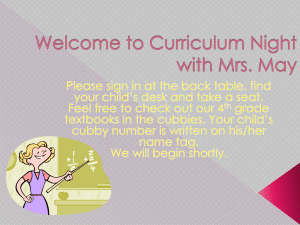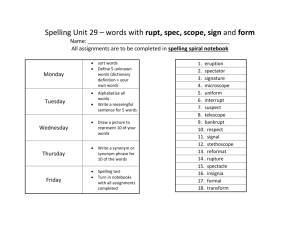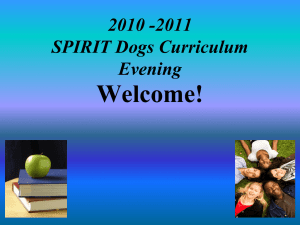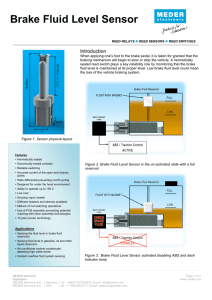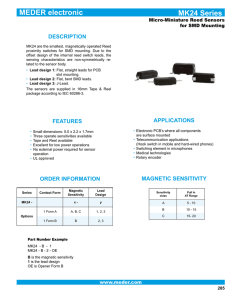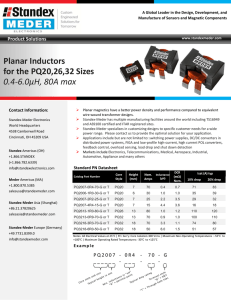Curriculum Night - Kyrene School District
advertisement
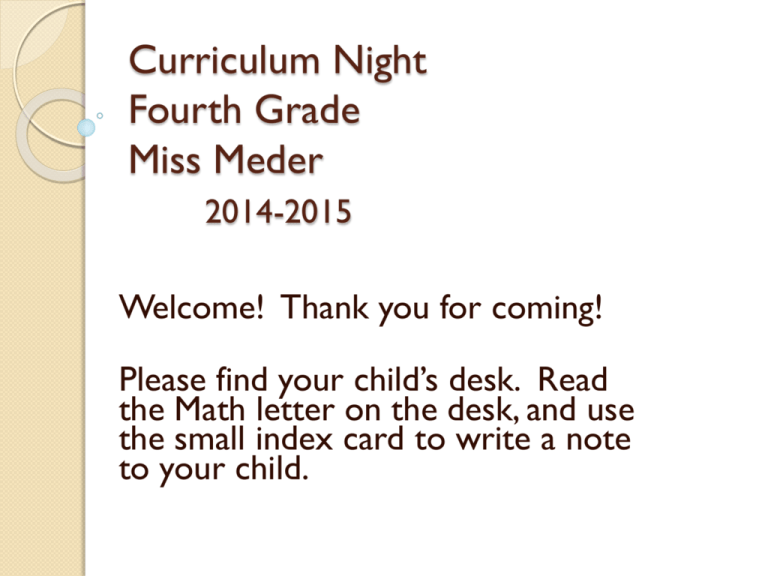
Curriculum Night Fourth Grade Miss Meder 2014-2015 Welcome! Thank you for coming! Please find your child’s desk. Read the Math letter on the desk, and use the small index card to write a note to your child. About Miss Meder This is my 28th year of teaching. I am a native of Arizona. My father taught at Washington High School in Phoenix. My oldest sister teaches fourth grade in Boise, Idaho. A Typical Day Morning Routine/Morning Meeting Math Special Area class 9:35-10:25 Grammar/Spelling/Writing Recess/Lunch Science/SS/Health Language Arts Common Core Standards This is a national effort to have students across the country learn the same knowledge in Math and English language arts. The emphasis is on critical thinking over rote learning of facts. Learning Goals/Scales These goals are taken from the Common Core Standards and are taught with the adopted curriculum. Goals: a statement of what students will know or be able to do. Activities are then done to help students attain these goals. Scales: used to measure knowledge and growth Shown on a point system from 4.0-1.0. Math Scott Foresman: traditional textbook that focuses on practice and problem solving Investigations: focuses on critical thinking and reasoning Problem Solving notebooks. IFG: Instructional Focus Groups Common Core Math Standards Operations and Algebraic Thinking Number and Operations in Base Ten Numbers and Operations: Fractions Measurement and Data Geometry Social Studies Harcourt textbook World History: exploration of Arizona Arizona statehood and history Arizona Native American tribes Geography: maps; landforms Health Life Management Skills Safety and Injury Prevention Nutrition Community Health Resources Disease Control and Prevention Personal Health and Hygiene Human Growth and Development Science FOSS ◦ ◦ ◦ ◦ Process Skills/Scientific Method Magnetism and Electricity Water: water cycle Animal Adaptations Language Arts Spelling: goes along with the story; vocabulary included Spelling dictation will be given on Fridays. Harcourt Reading program Book projects: one each quarter Writing process: Thinking Maps based Literature Studies Write From the Beginning Types of writing: • Narrative (personal and imaginative) • Response to Literature • Expository (nonfiction) • Argumentative (persuasive, problem/solution) • Summarizing Components: Focus Model Writing Mini-Lessons Writing rubrics Unassisted Writing Thinking Maps Eight maps: Circle; Bubble; Double Bubble; Tree; Flow; Multi-Flow; Brace; and Bridge A visual way to organize information linked to a specific thought process. Helps the brain make patterns and connections Can be used in all subject areas Specials Monday- Computer Lab 9:35-10:25 Tuesday- P.E. 9:35-10:25 Wednesday- Music 9:35-10:25 Thursday- Library 9:35-10:25 Friday- Art 9:35-10:25 Homework Homework should take about 20-30 min. plus reading for 15 minutes (or 1 hour total for the week). Book Projects: one per quarter Incentives: end of the week enrichment time, privilege cards, sense of completion and success Natural or Logical Consequences: Study Hall, incomplete assignments which creates more work, lower grades, etc. In fourth grade, we want the students to be responsible with their work. If your child forgets his/her homework, please allow him/her to accept responsibility and deal with the related consequences. Grades Grading scale: assignments are weighted, tests and quizzes count for more than classwork 100-90%=A 89-80%=B 79-70%=C 69-60%=D 59% and lower=F Grades on assignments and assessments Mid-term Progress Report (Parent Vue is available anytime) Report card Planners At the end of each day we write what we learned and accomplished. We also write any project dates or reminders. Homework assignments will be written there as well. Should be brought home every night so you can see what is going on in the classroom. Used as a communication tool. COOL COYOTE CODE BE: RESPECTFUL RESPONSIBLE SAFE . Classroom Rules: Love and Logic Our class rules are: 1. I am responsible for my own learning. 2. In the classroom, we will not cause a problem for ourselves or others (including Miss Meder). PBIS/Love and Logic Rules are few Situations are dealt with as they arise. Consequences will be designed to fit the problem. Enables the student to grow and learn from their actions. Gives the kids opportunities to be personally responsible for their choices and helps them make better choices in the future. Communication The best way to contact me is through email lmeder@kyrene.org Classroom phone number is 480-541-2743. You may also send a note with your child. Website: http://www.kyrene.org/staff/lmeder Newsletter and other information posted on website (monthly). Friday news emails. Weekend Envelopes sent home on Fridays with work from the week inside. Behavior Report – starting Aug. 17th; sent home to be signed and returned. Internet Short cut To get to the Colina home page, use this address for a short cut: www.kyrene.org/col To get to Miss Meder’s home page, use this address for a short cut: www.kyrene.org/lmeder Thank You! Thanks for coming tonight. I appreciate all that you do to help your child get the most they can out of school. I’m looking forward to a great year of learning with your child.
